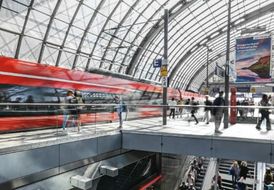Human Resources
To implement the Strong Rail strategy, we rely on adequate equipment and qualified, skilled employees. DB Group has a high annual need for new employees. This is reinforced by the age-related retirement of numerous employees as well as the elective model for working hours agreed under collective bargaining agreements.
The collective bargaining negotiations due for 2023 carry risks associated with industrial action measures and unscheduled wage increases.
The shortage of skilled labor, reinforced by demographic change, is a core risk for our business. It is becoming increasingly difficult and time-consuming to fill vacancies with qualified personnel. This in turn results in risks such as low personnel coverage to safeguard ongoing business and the long-term loss of knowledge, especially for railway-specific professions.
We are working to counteract these risks in particular by further developing our employment conditions. This increases the loyalty of our current employees and signals our attractiveness as an employer on a competitive labor market.
Through the further development of our learning infrastructure in the sense of an open, Group-wide learning process, the expansion and digitalization of qualification capacities, the new design of general and functional training (retraining) and the measures for strategic succession planning, we ensure sustainable and effective knowledge management and counteract the risk of a loss of knowledge.
DB Group’s green and digital transformations are critical for the successful implementation of the Strong Rail strategy. To provide the skills, qualifications and specializations that we need in good time and in sufficient quantity and quality is a challenge that we are counteracting through the further development of our strategic workforce management and our foresight approach “Lab1 – professions of the future.” From this, we derive implications for recruitment, hiring and further qualification at an early stage.
One important challenge here is to shape digital transformation in close cooperation with employees and stakeholders. Our goal is to offer all employees long-term and sustainable prospects within DB Group.
Appropriate measures for cross-generational and inter-cultural cooperation, as well as general conditions for the equalization of participation of all genders increase our appeal as an employer and reduce risks that may result from changes in employee structure and non-equal participation of employee groups. Our diversity management is committed to this with the Group initiative “Uniquely different.” and the strategic approach to increasing the proportion of women in management positions.
Risks also arise if we could not respond quickly enough to the changing requirements of a volatile market environment due to inflexible working methods and would therefore not meet the requirements of our employees for a modern working environment. We counter this by driving forward modern working environments as part of numerous programs, initiatives and communities within DB Group.
In order to continue to provide our executives with the appropriate skills and methods to be successful in modern, digitalized working environments, we are constantly developing the training and continuing education program for executives in the DB Academy.
Against the backdrop of economic crises with unclear prospects, the personnel cost structure plays an important role in recruitment. In terms of the labor market and transport market, our target is therefore to always conclude competitive collective bargaining agreements. Strong additional pressure on the development of wages can be expected from the surge in prices. Against this backdrop, we are attempting to conclude collective bargaining agreements in the upcoming negotiations with the EVG and the GDL, which on the one hand expresses the appreciation for employees, and at the same time secures the future viability of the Integrated Rail System.


